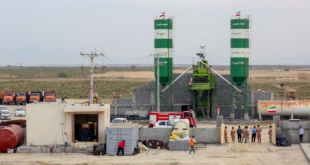WASHINGTON (Reuters) — US Secretary of State Condoleezza Rice on Thursday announced plans to visit the Middle East next week to try to revive Israeli-Palestinian peace moves but analysts doubt she will make much headway.
Rice will leave Washington on Sunday and plans to visit Saudi Arabia, Egypt, Israel and the Palestinian territories, her first trip to the region since a July visit during the monthlong war between Israel and Hizbollah.
Rice went to Beirut then but when she tried to return a week later Lebanon told her she was unwelcome after an Israeli bombing raid that killed many civilians.
The pending trip follows up on President George W. Bush’s UN General Assembly speech promising Rice would “go out, consult in the region … with those leaders who have a vision for a more moderate, democratic, stable and prosperous Middle East, State Department spokesman Sean McCormack told reporters.
“I would expect Israeli-Palestinian issues certainly would be on the table… as well as threats to peace and stability and moderation in the Middle East, for example, from Iran and from terrorist groups like Hamas and Hizbollah,” he added.
Since the Israel-Lebanon war, which ended with a ceasefire on August 14, the United States has been under growing pressure from its allies in Europe and the Middle East to make a greater effort to address the Arab-Israeli conflict.
Comprehensive Israeli-Palestinian peace talks collapsed in 2000 before the start of a Palestinian uprising.
The outlook for any revival deteriorated further when Palestinian Prime Minister Ismail Haniyeh came to power in March after Hamas roundly defeated Palestinian President Mahmoud Abbas’ Fateh movement in January elections.
Abbas has sought, so far without success, to forge a unity government with Hamas, which is still officially committed to the destruction of Israel.
US officials hope he can form a unity government that recognises Israel, renounces violence and accepts interim peace deals — thereby meeting Western conditions for ending an embargo on direct aid to the Palestinian Authority.
Middle East analysts are sceptical much can be accomplished because of the divisions among the Palestinians as well as the relative weakness of Israeli Prime Minister Ehud Olmert, whose popularity plunged after the Lebanon war.
Some analysts questioned Washington’s commitment to pursuing Israeli-Palestinian peace, although they noted a top US official recently argued this was necessary to maintain Arab and European support to curb Iran’s nuclear ambitions.
“For the Arab moderates and for the Europeans, some sense of progress and momentum on the Arab-Israeli dispute is just a sine qua non for their ability to cooperate actively with the United States on a lot of other things that we care about,” Rice aide Philip Zelikow said earlier this month.
Rob Satloff, a Middle East analyst with the Washington Centre for Near East Policy, said it was hard to make any headway because of the divisions among the Palestinians.
“It’s impossible to square this circle with a Hamas-led Palestinian authority,” Satloff said. “I just don’t think the fundamentals are there to make progress between Israel and the Palestinians.” Shibley Telhami, a Middle East expert with the Brookings Institution, also saw little chance for much headway.
“If I had to make a bet on what will happen in the next year, I think there will be a lot of diplomatic activity, a sense that there is more of a focus on Arab-Israeli peace making, but I think without any breakthrough,” Telhami said.
 Eurasia Press & News
Eurasia Press & News



